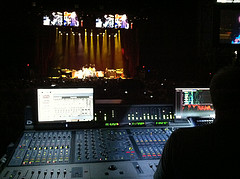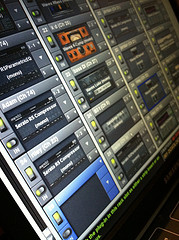Listening Strategies
Something we’ve been talking about a lot this year is the importance of listening to a lot of music. Most recently, I got to dig in on the topic with my friends Andrew Stone and Scott Ragsdale courtesy of Church Tech Weekly.
While we talk a lot about just listening, here’s a way you might take this a step further.
I’ve compiled a list of questions to ask yourself when you’re sitting down to listen. These are sort of my take on Brian Eno’s Oblique Strategies, but from more of a listening standpoint.
The idea is whenever you are listening to something whether it’s sitting down and focused or even just in the car or jogging or whatever, you use one of these questions and think about it in relation to what you’re listening to. You could probably even use a few of them at a time, but I wouldn’t overdo it to start.
Some of these give instructions on things to do. Some of these are kind of abstract. Try not to over think them, though. The goal of this exercise is to help you listen deeper into the music by focusing on different things. So just take these questions and apply the first thing you think of to what you’re listening to. This list is a work in progress so if you have ideas of other things to add to this, add them in the comments below. Here’s what I’ve got so far:
- What feels closest to you?
- What’s the biggest thing in the mix?
- What’s different in the 2nd verse?
- Do any sounds never repeat?
- How many voices are there?
- What drives the song?
- What is playing the melody?
- What is the second thing that sticks out at you?
- What is buried?
- What don’t you hear?
- What did you hear at the beginning that your forgot by the end?
- What don’t you like?
- What would you do differently?
- How deep is the bass?
- What sounds thin?
- What do you want to copy?
- How does it make you feel?
- Who plays the highest notes?
- How do things contrast?
- How dry are things?
- What is the bass doing?
- What’s the smallest thing you hear?
- What isn’t real?
- What instruments do you hear?
- What sounds dull?
- Is anything distorted?
- What changes when you adjust the volume?
- Is there any punch?
- Are transients pronounced or clipped off?
- What’s sharp?
- Which instrument is under appreciated?
- What didn’t you notice at first?
- What’s stuck in your head?
- How do instruments relate to each other in terms of tone and level?
- What do you hear if you only listen to one speaker?
- What do you have a hard time focusing on?
- How obvious is the kick drum?
- What’s in your face?
- What weighs the most?
- What’s squashed?
- How big is the mix?
- What effects are on the vocals?
- What’s weird?
- Does this sound expensive?
- What’s dull?
- What do you think is there that you’re not hearing?
- How close is the vocal standing to you?
- What is overdone?
- Is everything amazing?
- Who’s winning?

 Next Post
Next Post





I’m kinda stumped on thought on this question: “Does this sound expensive?” What do you mean, Dave?
BTW, great questions.
Maybe try the opposite question: Does this sound cheap?
Love the list…
My favorite: “What is the second thing that sticks out at you?” The pursuit of excellence tends to drive us to focus on that one thing that’s making the mix, and/or that one thing that’s breaking the mix. However, that’s generally just the top and bottom 10%. What about the other 80%? That’s really where the work gets done. Most of us can easily pick out the greatest asset and liability to a mix. But it takes a little more, to dig a little deeper, to get a little better. Like it or not, the mix will never be greater than we are. The mix will improve as we improve – first.
This is great Dave!
My favorite questions to ask are.
Is the snare bigger or smaller than the kick?
How does the snare work with the guitars and vocal?
How does the kick work with the bass and piano.
What is the relationship between the lead and bg vox.